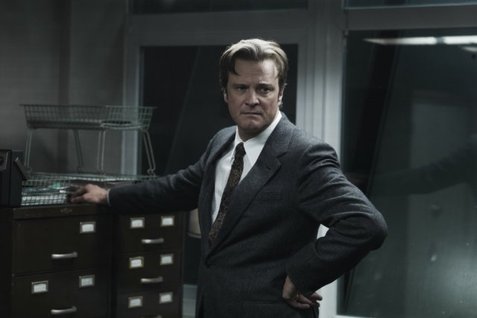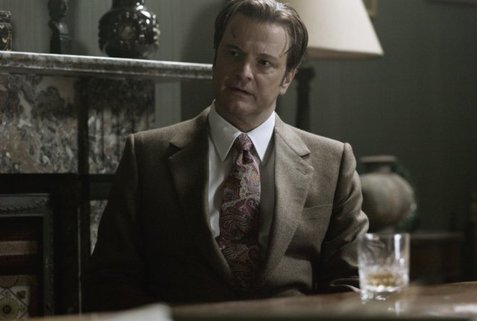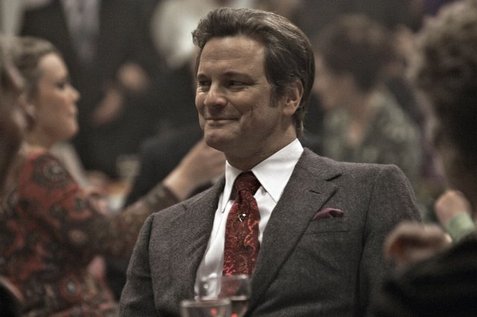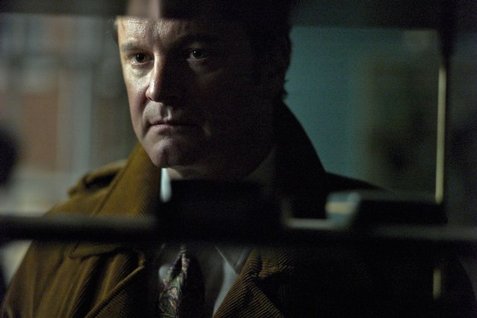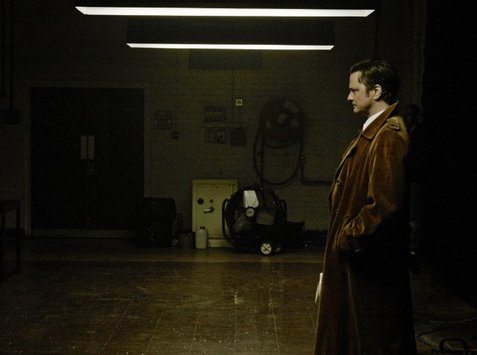A Roundtable Chat with Colin Firth (“Tinker, Tailor, Soldier, Spy”)
When Focus Features drops you a line and asks you if you’d like to head to New York City for an overnight stay at the Waldorf Astoria in order to attend a screening and press junket for “Tinker Tailor Soldier Spy,” based on the novel by John le Carré, you don’t think about it. You just say, “Yes.” And so I did. After catching a screening of the film on a Friday night, I got up on Saturday morning to begin the interviews of the day. After a roundtable with director Tomas Alfredson and screenwriter Peter Straughan, the two gentlemen left the room, to be replaced a few minutes later by one of the stars of the film, Colin Firth.
One word of warning: the potential for spoilers exists within the piece…like, to the point where Firth asks during one of his answers “not to turn this into spoilers when you write about it.” But, look, if you don’t want to know, then don’t read it. But given that the original novel was published in 1974, followed by the TV miniseries in 1979, it’s not as if you haven’t had plenty of time to absorb this information already…
Journalist: Are you a fan of the espionage and spy films?
Colin Firth: I like the good ones, yeah.
J: Do you have any favorites?
CF: No, not really. [Gesturing toward the journalist sitting next to him.] We talked about this, actually, him and I. He had to help me out. [Laughs.] No, I’m one of those people where, if you say, “Tell me what your favorite music is,” I can’t think of any music in the world. So that’s a difficult question. You throw something at me, I’ll tell you whether I like it or not. But, yeah, I’m a fan.
J: Well, we’re all like that. You ask me, and I’d do the same thing.
CF: Yeah, I know. Nothing is more guaranteed to draw a blank, I’m afraid.
J: In the film, we were trying to figure out exactly who the people up in that big office were.
CF: [Uncertainly] Oh, I hope I can help…
J: What does Bill Haydon (Firth’s character) do?
CF: He…right, okay, I’m going to get stuck here, so don’t trust me too hard on this. [Laughs.] He runs London Station, which means that, basically, he’s in charge of operations in the home base. From the home base. And I…don’t quite know how that configures, because MI-6, as I understand it, technically does not exist. Nobody acknowledges it. It’s so secret that there’s no such thing. And then MI-5, I guess they call it Military Intelligence Five, but Six, because it’s to do with foreign operations, and there aren’t supposed to be any… [Clears throat.] So that’s the zone that they’re in. So he’s one of the very, very senior guys, and very much a candidate to take over the whole thing.
J: Those are all senior guys up there, right?
CF: Yeah, those are the five guys.
J: How would you describe your character without giving anything away?
CF: Can’t. [Laughs.]
J: I loved that you didn’t telegraph it at all, but…how do you carry the knowledge (about your character) throughout your performance without giving it away?
CF: Well, it’s a tricky one in a way. I mean, some people would say that they did know. I mean, it’s obviously not a state secret, because the book’s been there for 40 years, and there was a TV series. So we’re not entirely dependent on not knowing. Because the story, in the end, is about much more than that. The thing is, everybody who is featured has some sort of alternate life, another agenda, whether it’s some sort of broken relationship or some guilt or disappointment. They’re all wearing a mask for one reason or another. And I think the beauty of the film is that we get that revealed in little hints. I think in a way it’s much more a personal, emotional story about the kind of things that people hope for and are disappointed in, and about loneliness and the failure to find trust or intimacy, than it is about who did it. Smiley has an attractive wife who will betray him constantly, and he will constantly forgive her and constantly take her back. And I think he feels that way about…his institution and about his country. You know? He has this endless faith in what the value system should be, and the romance that he bestows on it…he will stay committed to that no matter how often he is disappointed. And I think that is accurate in his marriage.
J: Haydon had (a relationship with) a boy and a girl in the film, so…
CF: [Laughs.] Haydon doesn’t care too much. He cares enough to tie the ends up. You can argue that Haydon’s the most mysterious character in a way. The motif of the Russian doll…what do you call those, when it’s a doll within a doll within a doll?
J: Nesting dolls.
CF: That was actually used in the TV series as the logo, in the opening credits. And that’s drawn from a passage in the book, where Smiley, having just interviewed Haydon at the end, he speculates…he spends about three pages trying to guess what Haydon’s motives are and what he’s really made of. And he compares him to one of those dolls. You get an interpretation, you look inside, and there seems to be another one, and then there seems to be another inside that. Is he motivated by genuine altruistic political ideology, or is he just a narcissistic sociopath? Is it all about him? He thinks he’s Lawrence of Arabia. He wants to drag the ignorant and afflicted out of the darkness and lead them into the light and into prosperity. But he also just wants it to be about him. He’s the guy leading on the light charge, you know? So you can ponder that forever. I’m trying to answer your question, but…he’s affectatious. He wants to convince us that he’s a bohemian of some sort. He’s powerful and bright, forceful and charismatic enough to break some rules. He’s not a swaggering non-conformist, but just enough to…it’s little grace notes. This is why when I read it…it’s not described in terms of what he wears and everything, but I just said, “Well, he paints, let’s put him in the tweeds so he’s not as city-business-y as the others. And let’s give him red socks. And a flowery pocket handkerchief or something.” Just to say a little flamboyance and a twist.
J: But in a way, by betraying others, he stays true to himself.
CF: If you believe his ideology is as sincere as he says it is, yes. This is precisely what he says – and, actually, it’s a line I have to say because the script was, brilliantly so, pared right down. But the first draft of the script didn’t have the line about having to choose a side, and we didn’t ever really find out what Haydon’s motives were. And I said, “Well, listen, I don’t want to make it about Haydon and what he did and why, but I do think it adds complexity to the universe of that film.” Because that’s not an uncommon point of view. Certainly of that generation, during the period of Communism, where it wasn’t…loyalty to an ideology or a cause took precedent very comfortably for a lot of people. Loyalty to your nationality, what your government tells you to do. And if you profoundly disapproved of your government or your country, then I think some people did feel a loyalty to ally themselves with one that they approved of. And he says that. “Yeah, I had to pick a side, and the west had become so ugly.” And in the book, he goes into greater and greater detail about that. He deconstructs it. And he certainly wouldn’t have been the only one.
Burgess, Mclean, Philby, Blunt…they’re not famous names to anyone who’s not British, but these were spies of that generation who…again, I can trust all of you not to turn this into spoilers when you write about it, because when applied to Haydon, it gives too much away. But these men shared secrets with Soviets for reasons which were not to do with self-advancement or finance. They just did it. And they were all like Haydon: educated in the elite system, I think most of them went to Eaton, or if not, Oxbridge. There was an above average number of gay guys among them. They were considerably about average intelligence. And privileged. And you have to ask, “Why?” Why would privileged people, who are taking all the benefits of the decadent Western capitalist society, throw it all away for giving secrets to a system which is to do with egalitarianism and is anti-capital and anti-wealth?
A very interesting piece of symmetry, just from my own personal point of view: the first play and film I ever did was called “Another Country,” which was entirely based on Guy Burgess’s formative years, asking, “Why would someone from a privileged school like that become a spy?” And it was, in the theoretical world of this writer, it was connected to his homosexuality and to the era in which he grew up. The 1930s, during which communism could be far more comfortably idealized. We didn’t know about Stalin’s purges. The Spanish Civil War was raging, people were flocking to fight the angels or the devils, however they saw them. And the fact that the Burgess character, if you like, who’s called Guy Bennett, the fact that he’s gay means that he feels that he has to hide a lot. And he feels that he has to use subterfuge to conduct his personal life. And, therefore, the school becomes a sort of training ground to become a spy. And it also becomes the place where you most learn to want to screw the system. So that story ends the character saying, “You know what? To hell with them all. I will take their privileges, but I’ll be undermining them and I’ll be screwing them at the same time.”
J: Could your character exist now?
CF: I can’t imagine it. Not in those configurations. I can’t imagine somebody…I think those figures, the components aren’t the same. That generation of pre-WWII, pre-Soviets elite English schoolboys who were weaned while the British Empire was still very much alive as an idea. And so was Communism. And those things made very convenient polarities in people’s political minds. Now, those polarities have disappeared, so those components are gone. So it’s very hard to see how anybody…how exactly the same kinds of people would do those same kinds of things for the same reasons. I think it’s pretty unlikely.
J: There’s also the idea of someone from a privileged background who’d like to share his wealth.
CF: Now, I think that is possible. Absolutely. I was listening to a guy on TV…he didn’t come from a privileged background. He came from a poor background, but he became a successful lawyer, and he gave it all up for politicking. This guy was on C-SPAN this morning, he was talking about Occupy, and he’s part of it. He just said, “No, I’ve thrown that away, because I think it’s far more important to think about how we should live our lives, that they aren’t just to do with personal gain and personal achievement.” And he’s a highly educated guy who had the capacity to…who I think did earn a lot of money, but he decided to go a different way. So I think there are variations on it, just in terms of people giving things up. Having said that, I’m not going to idealize the likes of, for instance, Kim Philby, on whom I think Haydon is largely based or at least inspired by. And I know that le Carré would not want that man idealized. le Carré was an active intelligence officer at the time they killed Philby. He was active, and…I know this from interviews that le Carré’s done – it’s not anything I’ve been privy to, that I’ve heard personally [Laughs.] – but, yeah, you know, he’s just a very harsh judge of Philby. He’s very clear on the fact that Philby’s treachery cost lives. And I think we’d probably question the purity of his ideals as well. So it’s complex. And I wouldn’t say that Burgess, Mclean, Philby, or Blunt were motivated by exactly the same things. Burgess seemed to be to be a more feckless creature than Mclean, who I think was more serious politically. They just happened to have come up through the ranks together.
J: How familiar with the book were you?
CF: Not at all.
J: Have you read it since?
CF: Oh, now I have, yes. Several times.
J: But not back then?
CF: No.
J: And the TV series?
CF: I don’t know whether I saw it. It’s one of those things that’s so present in one’s life that you know it whether you’ve ever seen it or not. I mean, I probably saw some episodes, and it was…whatever you were watching on TV at the time was so constantly being traded that you were being aware of it all the time. And then people talked about it all the time. So it had a huge presence and a huge impact. You know, I remember at one point not being able to remember if I’d ever actually read “Great Expectations.” [Laughs.] Or if I’d only ever seen films and TV adaptations and had it read to me at school in class. Had I ever actually at any point sat down and read it? But I could probably take you through that story in great detail…and I don’t think I read it! And le Carré’s a bit like one of these cultural reference points. When the Berlin Wall came down, I think most people were less concerned about what would happen to the political geography of Europe than they were about what would happen to John le Carré. [Laughs.] Actually, I think some of his best work is post-Cold-War stuff.
J: Having read the book finally, are you impressed that it was pared down to just over two hours?
CF: Absolutely. Well, yeah, I think what the film has done – and I think this is why he has endorsed it so heartily – is, instead of trying to capture every prosaic detail of the whodunit and all the strands, it basically focuses in on what the experience would be like, to have put your trust in an institution like that and to be in that world, where it’s all you’ve got. Because you can’t put trust in your personal life if you’re a spy. You can’t share that. You know, I think that I do know…I’ve heard that there was a response from a group of spies who saw this film, and there’s a line that Tom Hardy has, where he says, “I’ll do this one condition: I’m out. I want a family. I don’t want to end up like you lot.” And apparently it got a big laugh…of painful recognition. [Laughs.] And I think it’s as much about that as anything else. It’s about loneliness – male, mostly – and isolation, and I think it’s to do with what that feels like, rather than chasing down all the storylines.
Related Posts
You can follow us on Twitter and Facebook for content updates. Also, sign up for our email list for weekly updates and check us out on Google+ as well.

